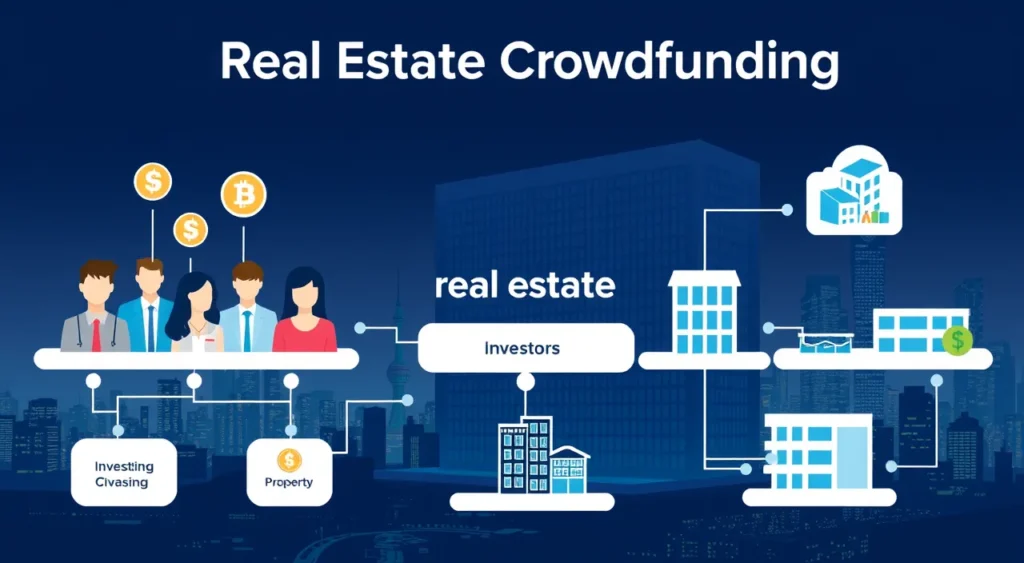Did you know real estate investments have outperformed the stock market since 2000? They’ve seen an average annual return of 10.71% compared to the stock market’s 5.43%. This is why more investors are turning to property investment platforms. Real estate crowdfunding has changed the game, allowing people to invest together and access opportunities once only for the wealthy.
This new way of financing real estate has made it easier for people to invest with little money upfront. Thanks to technology and social networks, real estate crowdfunding has opened up both residential and commercial investments to more people.
The global crowdfunding market is growing fast, with $34 billion raised so far. The real estate sector is a big part of this growth. Now, investors can share risks with others, making it safer and potentially more profitable than traditional REITs.
In this guide, we’ll dive into real estate crowdfunding. We’ll cover its quick rise after the 2012 JOBS Act and the different investment strategies and platforms today. Whether you’re new to investing or experienced, this guide will help you understand crowdsourced property investments.
Key Takeaways
- Real estate crowdfunding offers higher average returns than the stock market
- Investors can access diverse property investments with low startup capital
- Crowdfunding platforms provide opportunities for both accredited and non-accredited investors
- The JOBS Act of 2012 significantly boosted real estate crowdfunding activities
- Investors should consider platform fees, investment types, and risk factors before participating
Understanding Real Estate Crowdfunding

Real estate crowdfunding has changed how we invest in property. It lets people join the real estate market with less money. This way, more people can invest in property.
Definition and Concept
Real estate crowdfunding means many people pool their money for property projects. It’s a way to own a piece of property without needing a lot of money. The minimum investment varies, but it’s often around $5,000.
How It Differs from Traditional Investing
Crowdfunding is different from traditional investing because it’s more flexible. You can invest in many properties at once. This makes your investment safer. You can choose how long you want to invest, from 1 to 10 years.
The Role of Technology
Technology is key in real estate crowdfunding. Websites like Fundrise and RealtyMogul help connect investors with deals. They handle the hard work, making it easy for you to invest. The market is growing fast, expected to hit $161.8 billion by 2030.
“Real estate crowdfunding is reshaping the investment landscape, making property investment accessible to a wider audience.”
The JOBS Act of 2012 made crowdfunding easier. It combines the old benefits of real estate with new flexibility. This makes it a great choice for adding variety to your investments.
The History and Evolution of Real Estate Crowdfunding
Real estate crowdfunding has changed how we invest in property. It started in 1714 with “The Longitude Prize” in Britain. In the 19th century, financiers used similar methods to fund railroad networks. The term “crowdfunding” first appeared in a 2006 Wired magazine article.
The idea grew with platforms like GoFundMe and Kickstarter. These platforms led to real estate crowdsourcing platforms becoming a big deal. Crowdfunded real estate projects became legal for nonaccredited investors on May 16, 2016, marking a big change.
Equity crowdfunding for properties lets many people invest with small amounts. This makes real estate investment open to more people. Both accredited and non-accredited investors can join in with low contribution minimums.
- Platforms like Sharestates, Fundrise, and Yieldstreet changed real estate syndication
- Investors get access to deals they couldn’t before
- Sponsors get more capital and easier fundraising
The rise of remote work has changed what people want in homes. This shift has made crowdfunded projects focus more on homes for work-from-home setups. Also, more people want homes that are good for the environment.
Despite challenges like rules and liquidity, real estate crowdfunding’s future looks bright. It’s making property investments more accessible, changing the finance world.
Legal Framework: The JOBS Act and Its Impact

The rules for real estate investing have changed a lot lately. These changes have opened up new chances in crowdsourced real estate and property crowdfunding.
Securities Act of 1933
The Securities Act of 1933 started the rules for selling securities. It said who could be called an accredited investor. This rule had limited who could invest in real estate for a long time.
Jumpstart Our Business Startups (JOBS) Act of 2012
The JOBS Act of 2012 changed real estate investing a lot. It made rules easier, letting more people invest in private real estate deals. This act let non-accredited investors join crowdfunding platforms. This greatly increased the number of investors.
Regulatory Changes and Their Effects
The JOBS Act made several big changes:
- Increased fundraising limits under Regulation Crowdfunding to $5 million
- Introduced Regulation A+, allowing companies to raise up to $50 million
- Permitted general solicitation of private placements
These changes have helped over 100 real estate crowdfunding platforms grow. Now, investors can start with as little as $500. This has made real estate investing more open to everyone, leading to big growth.
The JOBS Act has made real estate investing more open to many. It’s key for investors to know these rules when looking into property crowdfunding.
Types of Real Estate Crowdfunding Investments

Real estate crowdfunding lets you invest in different ways online. These options suit many investor tastes and risk levels. They are part of the real estate financing world.
Debt investments mean lending money to property owners or developers. Preferred Equity gives a fixed return and gets paid first. Common Equity might offer higher returns but is riskier.
Some investors spread their money across these types. For example, one investor put $500,000 from a rental sale into crowdfunding, hoping for a 12% return. This way, they kept their income and avoided property management troubles.
“I personally invested in Preferred Equity and Common Equity due to a preference for more upside and tax considerations.”
Platforms like Fundrise, EquityMultiple, and YieldStreet offer these options. They have different minimums and fees. Fundrise, for example, has beaten traditional stock market ETFs, with a 10.79% return over five years.
Real estate crowdfunding lets investors see a variety of properties, from homes to businesses. You don’t need to own them directly. This method can diversify your portfolio and might bring higher returns than usual investments.
How Real Estate Crowdfunding Works

Real estate crowdfunding changes how we invest in property. It lets people put money into real estate with less capital. This mix of equity crowdfunding and real estate syndication opens new doors for investors.
The Investment Process
Investing through real estate crowdfunding is easy. People look at properties, pick what they like, and put in their money. The market is booming, expected to hit USD 793,476.5 million by 2032. This shows more people are interested in this way of investing.
Platforms and Their Roles
Crowdfunding platforms connect investors with real estate developers. They check projects, handle investments, and share profits. These platforms offer different ways to invest, like equity and debt. They do due diligence, raise funds, manage properties, and handle exits.
Minimum Investment Requirements
Real estate crowdfunding is appealing because it’s accessible. Some platforms let you invest with just $500, while others need $10,000 or more. This makes investing in real estate open to more people, making it more democratic.
- Equity investments: Higher risk, longer holding periods
- Debt investments: Fixed interest payments, lower risk
- Fund-based investments: No direct property ownership, potential for dividends
Investors should know about fees, which are usually 1% to 4% of the amount invested. These include management, advisory, and early redemption fees. Even with these costs, real estate crowdfunding can offer diversification and passive income without the hassle of managing properties directly.
Benefits of Real Estate Crowdfunding

Real estate crowdfunding lets investors diversify their portfolios. It’s a new way to invest in property, needing less money than old methods.
Property investment platforms are growing fast. Estateguru in Europe has raised over €818 million from 161,100 investors. Fundrise, in the US, has over 385,000 investors and a $7 billion portfolio. These numbers show more people are using crowdsourced real estate financing.
One big plus of real estate crowdfunding is it’s easier to get into. You can start with small amounts. This makes it possible for more people to invest in real estate.
Tax benefits also make it attractive. Investors can save up to $8,500 in taxes. Plus, depreciation lets investors deduct $727.27 each year. This is because the IRS says residential buildings last 27.5 years.
- Portfolio diversification
- Lower minimum investments
- Potential for higher returns
- Tax advantages
- Access to exclusive property investments
But, there are risks too. Things like platform bankruptcy and management fees can happen. It’s important to pick reliable platforms to enjoy the benefits of real estate crowdfunding.
Risks and Challenges in Real Estate Crowdfunding

Online real estate investing through crowdfunding platforms is popular. But, it comes with risks. Investors need to know these challenges to make smart choices in peer-to-peer property funding.
Market Volatility
Real estate markets can be unpredictable. Property values change due to economic conditions, local development, and demand. This can affect returns on crowdfunded investments. Real estate crowdfunding offers higher risk-adjusted returns, but investors should be ready for market downturns.
Liquidity Concerns
Real estate investments are hard to sell quickly. Crowdfunding platforms often have hold periods. This makes it hard to get your money if you need it fast.
Platform-Specific Risks
Each crowdfunding platform has its own risks:
- Management fees that can reduce returns
- Limited track records because the industry is new
- Potential for platform bankruptcy or closure
Investors should research platforms well before investing in online real estate.
“Diversification and understanding investment options are crucial to mitigate risks in real estate crowdfunding.”
By knowing these risks and challenges, investors can make informed decisions. This helps protect their investments in peer-to-peer property funding.
Comparing Real Estate Crowdfunding to Traditional Investments

Real estate crowdfunding has changed the way we invest in property. It brings new chances that traditional methods don’t offer. With fractional property ownership, you can join big projects with just a little money. This opens doors for many investors who couldn’t before.
One big difference is how much money you need to start. Traditional real estate usually asks for a lot of money upfront. But crowdfunded property deals can start with as little as $500. This makes real estate investing more accessible to everyone.
Diversification is another plus. Real estate crowdsourcing platforms let you invest in many properties at once. This can lower your risk compared to owning just one property.
Let’s look at some key differences:
- Minimum investment: Crowdfunding $500-$1000, Traditional often $100,000+
- Diversification: Easy with crowdfunding, challenging with traditional methods
- Management: Hands-off for crowdfunding, active for traditional investments
- Liquidity: Varies by platform for crowdfunding, typically low for traditional real estate
While crowdfunding offers exciting chances, it comes with risks. Real estate crowdfunding and traditional investments have big differences in risk. It’s important to think about your goals and how much risk you can handle before choosing.
“Real estate crowdfunding has transformed the investment landscape, making property deals accessible to a broader range of investors.”
It’s key to understand these differences to make smart investment choices. Whether you choose crowdfunding or traditional methods, doing your homework is crucial for success in real estate.
Real Estate Crowdfunding Platforms: An Overview

Real estate crowdfunding platforms have changed property investing since the early 2010s. They let investors join in with little money. Thanks to technology, investing in properties worldwide is now easier.
Popular Platforms and Their Specialties
Many platforms meet different investor needs. Some focus on equity, while others on debt. For example, Bricksave lets you start investing with just $1,000, welcoming more people into the market.
Fee Structures and Returns
Fees on these platforms range from 1% to 4% of what you invest. Returns can vary a lot, from 6-7% for safe bets to 300-400% for riskier ones. You can get income every quarter, from 5% to 11%. Investments can last from 6 months to over 10 years.
Accredited vs. Non-accredited Investor Options
The JOBS Act of 2016 made real estate investing open to more people. Accredited investors, with $1 million net worth or $200,000-$300,000 income, have more choices. Platforms follow 506b or 506c rules, with the latter needing proof of accredited status.
“Real estate crowdfunding has allowed individual investors to pool their money with others, making investing in real estate more accessible and affordable.”
When picking a platform, think about what you want to invest in, how liquid it is, and what services it offers. It’s important to do your homework to succeed in crowdfunded real estate.
Due Diligence in Real Estate Crowdfunding

When you start with crowdsourced real estate, due diligence is crucial. You need to research the platforms, projects, and market conditions well before investing. Look into financial reports, developer histories, and if the project can succeed.
Property crowdfunding sites offer many choices, but each has its own risks. It’s important to know about legal issues, as breaking the law can cause big problems. Platforms like RealtyMogul focus on careful of markets, partners, and financial plans to safeguard investors.
Here are some tips for alternative real estate investments:
- Check the platform’s trustworthiness and financial health
- Look at the management team’s experience and success
- Know how easy it is to get your money back and exit strategies
- Think about the project’s location and type of property
- Review expected returns and fees
Keep in mind, past success doesn’t mean future wins. Real estate markets can change quickly. So, think long-term when investing in property crowdfunding. With careful research, you can make smart choices and enjoy the benefits of this new way to invest.
Real Estate Crowdfunding Strategies for Investors

Real estate crowdfunding offers unique chances for investors. Online platforms have changed how we invest in property. Let’s look at some effective ways to boost your returns and cut risks in this exciting field.
Portfolio Diversification
Spreading your investments across different types and locations is a smart move. This balances risk and potential returns. For instance, you might invest in both homes and commercial spaces or projects in different cities.
Risk Management Techniques
To handle risks in real estate crowdfunding, follow these tips:
- Do deep research on each project
- Start with small investments to test the waters
- Don’t put in more than you can afford to lose
- Keep up with market trends and economic factors
Long-term vs. Short-term Approaches
Your investment time frame is key. Long-term investments aim for property value growth and steady income. Short-term strategies might be about quick flips or development projects. Think about your financial goals when picking between these options on online platforms.
“Real estate crowdfunding allows for investments with a minimum as low as €500, making it accessible to a wider range of investors.”
Successful real estate crowdfunding needs a balanced approach. Mix these strategies with your financial goals for a strong investment plan.
Conclusion
Real estate crowdfunding has changed how people invest in property. It’s now easier for more investors to get involved. The market is expected to grow to USD 869 billion by 2027.
Platforms like Fundrise, Crowdstreet, and RealtyMogul let investors put in small amounts. This way, they can invest in different real estate projects.
The rise of real estate syndication comes from new tech and laws, like the JOBS Act of 2012. These platforms offer different ways to invest, starting from just $500. This makes real estate investing more open to everyone.
Investing in real estate crowdfunding has its perks, like the chance for higher returns and not having to manage properties yourself. But, there are risks too. Investors need to understand these risks and do their homework.
As the field grows, it will likely play a bigger role in financing real estate and helping people invest. It offers a chance to diversify portfolios and support local projects.
FAQ
What is real estate crowdfunding?
Real estate crowdfunding lets investors pool money online to buy property or shares. It’s a way to diversify your investments and grow your wealth. You can own property with just a small upfront payment.
How is real estate crowdfunding different from traditional real estate investing?
It requires less money to start and spreads out the risk among many investors. You can own a part of a property online. This makes it easier to get into real estate.
What is the history of real estate crowdfunding?
Crowdfunding started in 1714 in Britain with “The Longitude Prize.” In the 19th century, it was used for railroads. The term “crowdfunding” was first used in 2006. Real estate crowdfunding became big later on.
How did the JOBS Act impact real estate crowdfunding?
The JOBS Act of 2012 changed real estate crowdfunding. It allowed more people to invest in real estate. This opened up a new world of investing.
What types of real estate investments are available through crowdfunding?
You can invest in homes, commercial buildings, or new developments. You can also own a part of existing properties or REITs.
How does real estate crowdfunding work?
Investors pool money online to fund real estate. Platforms show the opportunities and manage the process. You can start with just a few hundred dollars. Funds often go into REITs that pay dividends.
What are the benefits of real estate crowdfunding?
It diversifies your portfolio and offers exclusive investments. You can get higher returns than REITs and start with little money. It also avoids common landlord issues.
What are the risks involved in real estate crowdfunding?
There’s risk from market changes and selling difficulties. Some platforms charge fees. The industry is still new, so projects may not have a long history.
How does real estate crowdfunding compare to traditional investments?
It offers bigger dividends and unique projects. It’s easier to start and avoids landlord worries. But, it might be less liquid than stocks and bonds.
What should investors consider when choosing a real estate crowdfunding platform?
Look at the platform’s deals, fees, and who it’s for. Check if it creates its own deals or just connects investors.
What due diligence is required for real estate crowdfunding?
Research the platform, the investment, and the real estate world. Check the project’s finances, the developer’s history, and the market.
What strategies can investors employ for real estate crowdfunding?
Diversify your portfolio and do your homework. Don’t put too much money in one place. Think about your time frame and balance income with growth.












